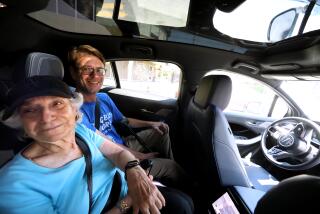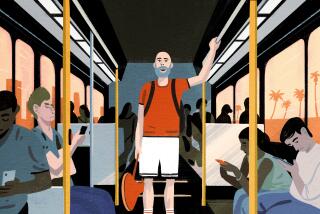Drive, he said, gently
- Share via
THERE is a handler for everything in this city, probably in yours too. There’s the trainer who comes to the house to work your muscles, the dog walker who scoops your pup’s poop, the party organizer, the homework helper, the massage therapist and the therapist who only sees other therapists.
In Manhattan, we also have teachers for the people who don’t drive -- and there are a lot. People don’t always learn here as teenagers because they usually don’t have the need, the courage or the money to get behind the wheel. So later in life they turn to specialists, handlers like Barry Weiss.
A former construction worker, Weiss has spent the last 28 years guiding all variety of nondrivers through the Manhattan motoring experience. New York State requires new drivers to spend five hours in a classroom, but Weiss knows the real learning is done on the road.
“You can’t learn driving from a book,” he says. “You’ve got to have a cab cut you off several times to know what you’re doing in this town.”
And what’s his advice in that circumstance?
“Pay attention,” says Weiss, bluntly reciting his mantra of the last 28 years. “People don’t. Instead, they’re listening to the radio, putting on mascara, sightseeing, talking on the phone, smoking a cigarette, reading the newspaper.
“I teach here because it’s more challenging.”
Weiss specializes in understatement and extraordinary calm. Perhaps this can be explained by his own history as a late bloomer on this city’s roadways.
He was born on Manhattan’s Lower East Side 61 years ago in an era and in a neighborhood where few people drove or owned a car. There wasn’t the need then, and in many pockets of the city there still isn’t.
New Yorkers ride buses, they use subways, they have strong legs. Cars are illicit. Housing one in a garage is like supporting a mistress. Driving one is like sleeping with the enemy.
Weiss got a license when he was a teenager but put it in the drawer. After he married and moved to Long Island -- hallowed ground of freeways and two-car garages -- he had to go back to driving school and relearn in his 20s what he’d learned in his teens.
Now Weiss specializes in re-learners, most of them older, their reflexes shot from living here all their lives and their confidence shaken after years in the passenger’s seat.
His older-female clients are especially prone to overreact, more afraid of killing someone else with a car than they are of hurting themselves.
“If they see a person walking off the curb a block away,” says Weiss, “they hit the brake. I tell them, ‘In Manhattan, you hit the brake like that, you get hit.
“ ‘Don’t over anticipate,’ I tell them, but be alert.”
Why would anybody choose to drive in this city? I do, but I am reminded regularly of the insanity of it. Late for an appointment last week, I sped up Flatbush Avenue in Brooklyn as if I was playing my son’s X-Box game Project Gotham, except during that digital drive in New York all I did to win points was execute a tail-out slide through cone markers while passing two cars and avoiding walls.
To avoid earning points on my license -- and manslaughter on Flatbush Avenue -- I had to veer around a woman with a baby stroller crossing against the lights, make it through fields of potholes, dodge double-parked trucks on every block and try to ignore the driver in the unmarked van behind me who for no apparent reason was relentlessly beeping.
All the while I wondered about Barry Weiss surviving, day in and day out, in the passenger seat of his beige, musty-smelling Ford Tempo with an extra rear-view mirror and his overriding foot brake.
Weiss is never bored. He has taught his share of celebrities -- dancer-choreographer Judith Jamison and film director Spike Lee, who apparently made Weiss promise never to reveal Lee’s real name (printed on his license).
Weiss also taught a man who insisted on bringing his therapist along in the back seat. The therapist took notes on how the man reacted to stress.
Then there was the older woman who, after many lessons in Manhattan but none changing lanes on a highway, asked Weiss to accompany her on a 35-minute drive to a cemetery in Valhalla, N.Y.
While she paid her respects to her dearly beloved husband, Weiss took a detour to salute the grave of Yankee great Babe Ruth with a hearty “Hey, Babe!”
Most of Weiss’ clients turn out to be older women such as Marilyn Stone, a former driver, whose husband is no longer able to chauffeur her to see the grandchildren in Connecticut, or divorcees who view finally learning to drive as a strike at independence, or middle-age urban moms eager to get the bulk bargains in the suburban superstores like Costco. (Weiss insists his wife never worries about him being alone with so many women. “I never bring my work home. I keep it in the car.”)
Weiss is apparently a natural teacher -- methodic, patient and endlessly interested in what’s on the streets. Usually, he picks up his clients in front of their apartments, drives them to one of the quiet streets rimming the island of Manhattan, such as Riverside Drive uptown or Washington Street downtown.
He might start by explaining in his low voice about right turns and then move on to right turns onto a one-way street and then right turns onto a two-way street.
He’s careful to introduce only what his students can handle. “I always tell my clients not to rush, even if there are 10 people honking behind. Let them pass you or stay behind. It doesn’t matter because you’re all going to end up eventually at the same light next to each other.”
Most published accounts by “older” drivers of how they overcame their phobia of driving, especially in Manhattan, focus on the relationship between the student and the instructor, frequently a charismatic but slightly elusive ethnic male.
Vanity Fair writer Amy Fine Collins recently chronicled her road to automotive freedom in a book about how she bonded with her driving teacher, a Turkish-born former masseur named Attila.
Barry Weiss is no Attila. When you look in Leo Rosten’s “The Joys of Yiddish” under “mensch,” you should (but won’t) find a line drawing of Barry Weiss. He’s the guy who wears an old green ski jacket, Mister Magoo-type reading glasses and soft-bottomed shoes.
He’s not big on charisma, but at $45 an hour (such a bargain) his talent is kindness.
It’s an attribute that ought to be transmitted more in the canyons in Manhattan and, yes, on the freeways of Los Angeles.
More to Read
Sign up for Essential California
The most important California stories and recommendations in your inbox every morning.
You may occasionally receive promotional content from the Los Angeles Times.













